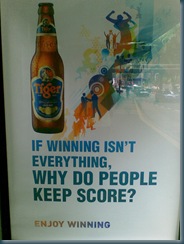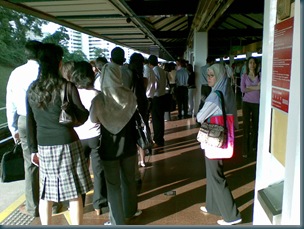Today, as I was feeling already depressed over my regular failings, I didn't attend one of my classes.
Why? - Let me elaborate...
I am actually very embarrassed coming to school late. More embarrassed than you would realized.
I woke up almost an hour after my class started and rushed to get ready. However, when I started to think about it, I realized that I would spend another hour travelling to school (too short of cash to hail a cab, and without another one to borrow it from). Realizing that I would be almost 2hrs (poss. 30mins more getting ready), I made this terrible decision to avoid going to class.
Of course, most of you reading this might be thinking that this may be rather extreme: avoiding classes to avoid embarrassment. Well, its more complicated than that. But, I can attest to the uniqueness of it all in my case. (however, not as unique as I may think - perhaps?).
I compare myself to everyone else I know. To be honest and entirely accurate, I compare myself to everyone else pessimistically. Lately, I have been feeling more retarded than usual. Everyone seems to be doing generally better than me (academically, at least). They have been able to cope with the work better and I have been sorely lacking potential in my own work. I blame myself for this - unpunctual, late-work, laziness...
I believe that people think that I am like that. They would in fact blame me for coming to class late and, hence, my embarrassment.
Very sad, emo post, yes?
I struggle to think if this attribution is rightfully justified. Let's review attribution theory to see if my dilemma fits.
Given someone's behaviour in a situation, one can either attribute it to the situation or choose to attribute it to the person. Hence, attributing the cause of the behaviour externally or internally, respectively.
Kelly's Covariation Model of Attribution postulates that three factors mitigates whether one attributes behaviours to stimuli in specific situations either way; these are Consensus, Distinctiveness, and Consistency.
In my case, I think my audience would attribute my deviant behaviour (unpunctuality, lateness, and laziness) as my fault - internally attributing it - and not the situation. Let's see -
Consensus refers to the extent to which others respond similarly to the same stimuli; contextually, whether others always come late to class. In this case, consensus is low: Vivian tends to be the last one to class usually.
The next factor to assess is the distinctiveness of the behaviour to the stimuli. In effect, the question to note is whether the behaviour occurs to only one particular stimulus and not any other. Does Vivian come late to classes only? No - he is constantly late for many different events. Distinctiveness is also low.
Last, the model appreciates the degree to which the stimulus and behaviour occurs repeatedly. Vivian comes last almost every lesson, every time. I think the consistency is high.
According to Kelly's model, for groups to attribute behaviour to the situation, or externally, all factors must be high. However, for groups to attribute the behaviour to the person, both consensus and distinctiveness must be low and consistency must be high - as in my case.
I guess my perceptions *were* indeed justified. That's 1 for Kelly, 0 for Vivian.
The theory seems intuitive, though; you already knew that I should be blame for my behaviour. However, does that mean that the theory has no usefulness?
Not really. As a predictive tool, it is utilized in criminal law, human resource management, education, and even marketing communication. However, it seems as if its use in the mentioned fields are misplaced. As mentioned, consistency plays an integral in the tool's applicability and, if it is used covertly, may be misused. However, if it is used more like a questionnaire, where overt responses are required, I believe that this may be more appropriate.
Moreover, the model supports more than a predictive function. For example, most of us have realized that we feel more comfortable walking into a lecture or tutorial late, if we have more people walking in with us. Sometimes we wait for more people to arrive (friends and such) just so that we can go in. Subtly, the idea is that we are reducing consensus of the behaviour, since it appears that more people are coming late. Consistency is similar.
Just to plague the concept with more complexity, I looked up the covariation model to discern other possible combinations.
First, from the model, it seems that consistency isn't a predicator of attribution. However, it serves as a prerequisite for determination. Without a high consistency, we cannot come to a conclusion. It is also argued that if there is low consensus and high distinctiveness, the behaviour is attributed to the interaction of the person and situation. However, if the consensus is high and distinctiveness is low, it is either the person or situation, but nothing is conclusive.
Oh well.
Society makes me more depress than usual.



